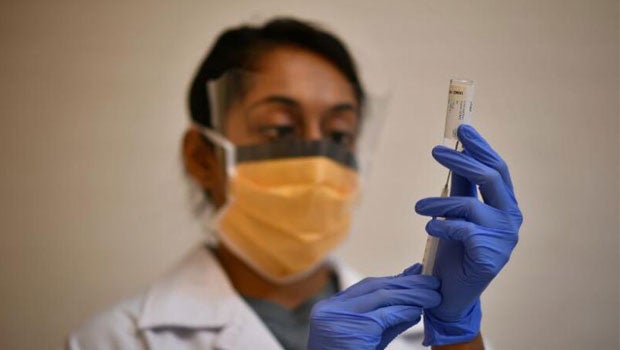
Phase three of Lunar-Cov19 co-developed by S'pore scientists expected to start by end-Dec
The final phase of the clinical trial for the Covid-19 vaccine that was co-developed by Singapore scientists is likely to start here before the end of this year.
Associate Professor Jenny Low, deputy clinical and scientific director at the SingHealth Investigational Medicine Unit, which is administering the trial, told The Straits Times: "We are currently in phase two of the clinical trial, and we expect the recruitment and dosing to be completed by this month. Phase three will begin, hopefully, by the end of next month."
The clinical trial process, which involves testing an experimental drug or vaccine on people, typically has three phases.
The first two, known as early-phase clinical trials, are mainly carried out among smaller groups of up to hundreds of volunteers to test the safety and efficacy of a vaccine.
In these stages, researchers look out for dangerous side effects and analyse patient samples to see how the human immune system is responding to the vaccine.
They also seek to determine how many doses are needed to incite the desired immune response.
Phase three trials are much larger in scope, usually involving thousands to tens of thousands of people. These are often held across multiple jurisdictions or countries.
The aim of these trials is to see if the vaccine can confer protection from infection. To determine this, some volunteers get just a placebo.
In June, the United States Food and Drug Administration said it expects a Covid-19 vaccine would prevent the disease or decrease its severity in at least 50 per cent of those vaccinated.
On the Lunar-Cov19 vaccine in clinical trials here, Professor Ooi Eng Eong of the Duke-NUS Medical School said it is too soon to say how many volunteers would have to be recruited for a phase three trial or where the trial could be carried out, citing the need for further analysis of data from phases one and two.
But Prof Ooi, who co-developed the vaccine with US pharmaceutical firm Arcturus Therapeutics, said: "Ideally, a phase three trial would be carried out where there is a large number of cases, but implementing vaccine trials at the peak of epidemics also presents logistic challenges."
He added that a balance may have to be struck. "I am confident the vaccine will work. The question is: Will it be a one-dose or a two-dose vaccine? I am still hoping we can discover it will work as a single-dose vaccine so people don't have to come back for a second dose."
If a phase three trial for the Singapore co-developed vaccine kicks off by year's end, it would put the Lunar-Cov19 vaccine among some 10 others at this stage internationally.

Worldwide, there are 154 vaccine candidates at the pre-clinical stage, meaning they have not been approved for tests on humans yet.
There are 44 others at the clinical evaluation stage, but only 10 of those have reached phase three trials, including front runners like the ones being developed by pharmaceutical company Moderna, as well as the candidate being worked on by the University of Oxford and biotech firm AstraZeneca.
Phase three trials for the Moderna vaccine are ongoing in the US, while the AstraZeneca trials are taking place in six countries, including South Africa, Brazil and Japan.
These late-stage trials are also taking place closer to home.
In August, Sinovac Biotech, a private Chinese pharmaceutical firm, and Bio Farma, an Indonesian state-owned company, launched a phase three trial in Indonesia.
Prof Ooi said the safety profile of the Lunar-Cov19 vaccine has been encouraging. But he noted that even though some phase three trials for Covid-19 vaccines abroad have been put on pause after volunteers fell ill, it did not mean the vaccine was causing the adverse reactions. "The fact that the trials are paused when there is a severe adverse event is a sign they are conducted safely."
Severe adverse events occur when a volunteer who receives the vaccine ends up in hospital, even if it was due to other causes, like a road traffic incident.
When such events happen, an independent body of experts step in to review the data to decide if the severe adverse event was caused by the vaccine or was completely unrelated, said Prof Ooi.













 Get it on Google Play
Get it on Google Play